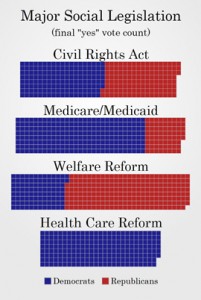
The Battle Of Ideas, Capitulation or Contribution?
Over the past several months, even years, there has been much extolling of the virtues of “bi-partisanship”. Personally, I’m not so much in favor of it, if it means capitulation and forsaking principles.  A smart guy over at politicalmathblog.com took the time to illustrate graphically the supposed perennial lack of “aisle crossing” by Republicans, the supposedly “conservative” party.
 The reason that the aforementioned smart guy at politicalmathblog.com created this graph was to visually demonstrate the lie being perpetuated by many of the folks on the left. He explains in his excellent post:
The reason that the aforementioned smart guy at politicalmathblog.com created this graph was to visually demonstrate the lie being perpetuated by many of the folks on the left. He explains in his excellent post:
‘The reason I’m so riled up about this is because Jim Lehrer, whom I like and respect, basically accused the Republicans of having a history of short term opposition on social legislation.”
I have a different take. The left’s definition of bi-partisanship, is either concession by ostensibly conservative Republicans or, at best, deal-making and influence peddling under the guise of compromise. Similarly questionable is the integrity, honor, and character of those fleetingly dissident members of the majority party who sell their votes to gain special privileges for their states.
It wasn’t always this way. At the time of this country’s founding the object of debate (while it sometimes did get heated) was to move the country forward. The Founders were looking for common ground so they could collaborate on important matters. It was not about earmarks, kickbacks, and vote trading.
As a case in point, I’ve been working my way through the Federalist as well as various anti-Federalist writings. I’m continually struck by the caliber of the discussion and especially by how much this country owes to the anti-Federalist movement. It seems to me that in this battle of ideas, there was no “losing” side. The country was the real winner and both camps contributed hugely to what became the uniquely American form of government.
 Richard Henry Lee was unarguably a founding father, a signer of the Declaration of Independence, a member of both the First and Second Continental Congresses, and served a one year term as President of the Continental Congress. It was as a member of the Second Continental Congress that he famously put forth the motion for independence:
Richard Henry Lee was unarguably a founding father, a signer of the Declaration of Independence, a member of both the First and Second Continental Congresses, and served a one year term as President of the Continental Congress. It was as a member of the Second Continental Congress that he famously put forth the motion for independence:
Resolved: That these United Colonies are, and of right ought to be, free and independent States, that they are absolved from all allegiance to the British Crown, and that all political connection between them and the State of Great Britain is, and ought to be, totally dissolved.
And yet, he was the author of the best known anti-Federalist papers.
In Letter I, written October 8, 1787, Lee admits that the Articles of Confederation were “inadequate to the exigencies of the Union… A convention, therefore, merely for vesting in Congress power to regulate trade was proposed. …” Instead, the participants in the convention ended up redoing the whole system. Interestingly enough, unlike some other anti-Federalists, Lee doesn’t dwell on this fact.
In Letter II, written on October 9, 1787, Lee puts forth his primary analysis of the defects of the Constitution as written.
There are certain unalienable and fundamental rights, which in forming the social compact ought to be explicitly ascertained and fixed. A free and enlightened people, in forming this compact, will not resign all their rights to those who govern, and they will fix limits to their legislators and rulers, which will soon be plainly seen by those who are governed, as well as by those who govern; and the latter will know they cannot be passed unperceived by the former and without giving a general alarm. These rights should be made the basis of every constitution; and if a people be so situated, or have such different opinions, that they cannot agree in ascertaining and fixing them, it is a very strong argument against their attempting to form one entire society, to live under one system of laws only.
He goes on to say the he gives little credence to the arguments against “bottoming the new Constitution on a better Bill of Rights.” Reading further, it’s clear that he has carefully examined the proposed system and finds merit in much of it. He continues his discussion and examination of the distribution of power in Letters III and IV. It does not read as an out and out attack on the Federalists.  Instead he takes exception to things he considers to be ambiguous.
By the first recited clause, direct taxes shall be apportioned on the states. This seems to favour the idea suggested by some sensible men and writers, that congress, as to direct taxes, will only have power to make requisitions, but the latter clause, power to lay and collect taxes, etc seems clearly to favour the contrary opinion and, in my mind, the true one, that congress shall have power to tax immediately individuals, without the intervention of the state legislatures[;] in fact the first clause appears to me only to provide that each state shall pay a certain portion of the tax, and the latter to provide that congress shall have power to lay and collect taxes, that is to assess upon, and to collect of the individuals in the state, the state[‘]s quota; but these still I consider as undefined powers, because judicious men understand them differently.
Lee continues, addressing other things, such as the qualifications for the Vice President, Trial by Jury, and other concepts now in the Bill of Rights. The Bill of Rights was not included in the original version and was brought about by just such arguments as these. He closes Letter V, by leaving the door open for compromise. He doesn’t say he can never be for the Constitution, instead he goes out of his way to point out (and justly so) that the Constitutional Convention was composed of such as “– America probably never will see as an assembly of men, of a like number, more respectable.”
The purpose of this post is not to reiterate all of Lee’s arguments, but rather to point out how they ultimately helped ensure that the Bill of Rights was quickly added to the Constitution. (We owe him a great debt for this.) At a time when their omission was considered superfluous, because everyone understood them, Lee and others wisely insisted that they be written down.
Even with the Bill of Rights and subsequent Amendments, the Constitution is a short document. Like in programming, elegance lies in simplicity. Contrast this with the 2000+ page health care bill over which there was almost no public debate. Put together by external organizations, like the Tides Center/Apollo Alliance, this bill was read and fully understood by few if any in Congress. Even Speaker Pelosi suggested that it would be best to pass it to find out what’s in it! The Constitution, while written in secret, was done at the behest of Congress. It was ultimately put forth for intense public scrutiny and debate, before ratification.
Perhaps one reason the Founders were able to find common ground in disputes was that they were united in understanding that human nature is flawed.  Their objective  was not to remake mankind conform to some idealized version of a perfect world. Rather, recognizing that all men are subject to the temptations that power over other men confers, they sought to fashion a government that safeguarded both liberty and order.
UPDATE:
This post was written pretty early in the history of this site. Since then, I’ve read quite a bit more. There is more than a little debate on the author of the anti-Federalist Letters from a Farmer. In this post I attributed them to Richard Henry Lee because the Britannica Collection Annals of America did so. Indeed there are many published books that have Lee as the author. However, Gordon S. Wood and others have made strong arguments against Lee’s being the pen behind these papers. Many conclude that we will never know who actually wrote them. Either way, this doesn’t change the crux of the article above. This is a learning process for all of the writers at WWTFT, and as we learn, you may expect us to update accordingly. Martin
 The posts are coming!
The posts are coming!


0 comments
Kick things off by filling out the form below.
Leave a Comment